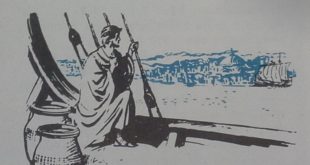Christianity was the movement that spread Across the Roman Empire Pointing the way for the rest of the ancient world toward belief in a single God. The year is 400 A.D. Andropolos paces impatiently up and down the deck of the merchant ship. He is eager to get back home; and to Andropolos, home is the city of Constantinople, a new capital of the Roman Empire. He can already see the walls and buildings of the great city shimmering in the distance. Now the ship is nearing the narrow Bosporus, the waterway where Europe and Asia are hardly a mile …
Read More »Tag Archives: Nicaea
The Crusades 1096-1260
ON A COLD NOVEMBER DAY IN 1096, a great crowd of people gathered in a field at the town of Clermont in France. They had come from miles around and near them were pitched the tents they had put up for shelter. For some days, Pope Urban II had been holding a great council of cardinals, bishops and princes. Today he was to speak to the people and so many wanted to hear that no building was large enough to hold them all. A platform had been built in the center of the field and as Pope Urban stepped up …
Read More »The Fall of Byzantium A. D. 992-1453
THE LONG struggle between the churches of the East and the West was only one of the many serious problems that weakened the empire and led to its downfall. Trade was another of its problems. Much of goods imported from the eastern world was sold to the west through Byzantine markets. A ten percent tax was collected on an imports and exports as well as on all goods passing through the Bosporus. This was one of the empire’s most important ways of collecting taxes. However, this rich flow of tax money began to get smaller and smaller in the tenth …
Read More »The Growing Church 100 – 500 A. D.
AT THE beginning of the second century, the Christian Church was a loosely organized group of independent local churches. There had been no strong leadership since the days of the apostles, no recognized authority to whom they could turn to settle their differences concerning the faith. Paul’s epistles had cleared up many points for them, but new questions were constantly arising. The Roman church had been taking a leading role for some time. There were a number of reasons for this. According to tradition, both Paul and Peter had died in Rome. It was the only church in the western …
Read More »


